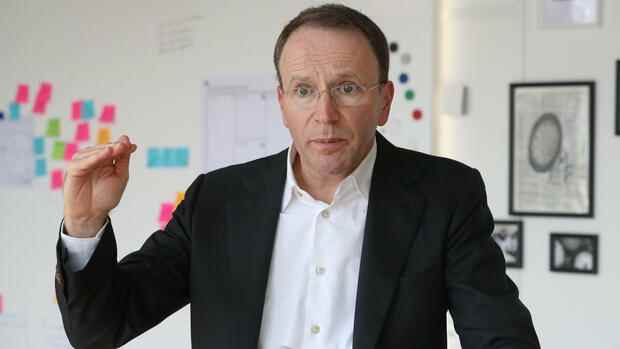The Nestlé boss prescribed a course correction for the health division.
(Photo: Reuters)
Zurich Nestlé boss Mark Schneider is making a course correction in the health division of the food giant. The group, based in Vevey, Switzerland, is considering the sale of the company Aimmune Therapeutics. This was announced by Nestlé on Tuesday at its investor day in Barcelona.
The biotech company had developed a therapy for peanut allergy called Palforzia. Nestlé acquired Aimmune two years ago for around $2.6 billion. But the purchase did not meet expectations, as Schneider admitted.
“We had high hopes for this business,” said the manager. Instead of being a blockbuster, i.e. a drug with annual sales potential of more than one billion dollars, Palforzia has turned out to be more of a niche therapy.
In the future, the healthcare division Nestlé Health Science will focus on dietary supplements and medical nutrition. Most recently, Nestlé has bought brands for vitamin supplements or protein drinks. The group also produces medical food for cancer patients, for example. The healthcare division still has some prescription drugs in its portfolio. But Schneider is no longer planning new acquisitions in the pharmaceutical sector in the future.
Top jobs of the day
Find the best jobs now and
be notified by email.
Nestlé boss Schneider is thus adapting the strategy in a core area of his vision for the food giant. The German manager has already sold the skin care division, reduced its stake in the cosmetics group L’Oréal and invested part of the billions in revenue from the deals in Nestlé Health Science.
Nestlé shareholders must reckon with write-downs
However, the trigger for the change in strategy is not the lack of effectiveness of the drug developed by Aimmune Therapeutics. According to the company, the therapy shows a significant reduction in the frequency and intensity of allergic reactions in infants and children as well as in adults with peanut allergy. According to Schneider, the effectiveness has exceeded the expectations from the clinical studies.
But after approval in the USA, it turned out to be impractical in everyday practice. Palforzia is associated with a lot of work for general practitioners. As a result, doctors had been prescribing the therapy far less frequently than Nestlé had anticipated, added healthcare chief Greg Behar. “We cannot extract enough value and leverage synergies to keep the product in our portfolio.”
Behar is therefore preparing the shareholders for a loss from the acquisition. “We expect a significant write-down on our books.”
Despite the setback in the healthcare sector, Nestlé has slightly raised its growth forecast until 2025. On Tuesday, Schneider announced an increase in sales in the mid-single-digit percentage range and a margin of 17.5 to 18.5 percent.
“We will continue to invest in future growth, strengthen our brands, launch significant innovations, drive digitization and increase our speed and flexibility,” emphasized the Nestlé boss. He also wants to increase the dividend every year and buy treasury shares worth CHF 20 billion between 2022 and 2024.
More: “Think bigger!” Nestlé boss Mark Schneider is turning the food giant upside down in a hurry.
